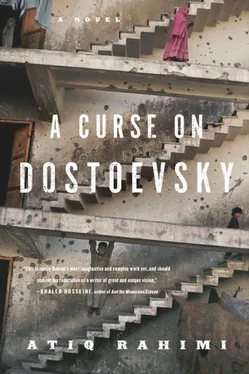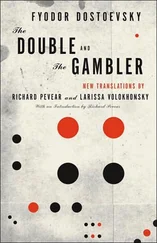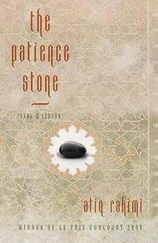I wanted to stand up and shout, “So that’s where Sophia is!” and throw my arms around your father.
“What do you do for work?” he asked, wrenching me from my delight. “What’s your name again?”
I told him my name, and that I worked at the university library. After a silence, in which he looked at me tenderly, he said: “I can see that you’re an educated man, from a good family.” Another pause. “I’ve two children. A girl and a boy. My daughter is pure and innocent…” He stood up. “It’s late. I have to go home. She’ll be worrying about me…”
We left the smoking room and lost ourselves in the gloomy, dusty fog of dusk. After a few steps in silence, your father continued as if he’d never stopped speaking. “But war recognizes neither purity nor innocence. That’s what terrifies me. It isn’t the blood or the massacres—what frightens me is that dignity and innocence are no longer valued. My daughter, like her mother, is the purest, most noble…” Again a silence, a long one this time, that went on until we stopped in front of your house. “This is my house!” he said, opening the gate. Trembling, I moved to shake his hand, but he stopped me. “You’re going home? You took me out and walked me all the way here, and now you think I’m going to let you go home?” He invited me in. As soon as I set foot inside I took a huge gulp of air, the air you had breathed. I held it for as long as I could as I followed your father through the little courtyard, under the espaliered vines starting to bud in the spring. I grew more and more nervous, dreading the moment of our meeting. My eyes were darting all over the place, taking in the nooks and crannies of the courtyard, the closed windows of the rooms, and the roof of the house, from which your brother was looking down with a pigeon in his hand. “Hello!” said your father. “Still on the roof?”
“There was a cat wandering around,” replied your brother mischievously. Your father turned to me. “That’s my son, Dawoud. He’s been looking after my pigeons since the schools shut down. I can’t get up there anymore.” We walked into the house. Your father took me into a dark room and lit a candle; then he left, leaving me to entertain myself by running my foot along the only kilim in the room. I was so excited, my heart racing so fast, that I didn’t even know whether to sit down on one of the three mattresses. I wondered if you were aware that I was here, in your house. But no. I wasn’t able to see you that evening, my beloved. I left the house after dinner, hoping to return soon.
Another excerpt:
Last Friday, as I was lazing around in bed trying to think of a reason to visit your house, I was rudely shaken from my idleness by the explosion of a bomb that shook the whole neighborhood. Panicking, I rushed out of my room and, finding myself prey to a strange impulse, ran to the site of the explosion. I was transfixed by what I saw. The tearoom was a burning ruin, emanating foul-smelling smoke. Men and women were busy digging bodies out of the rubble. From what they said, I understood that some people had been able to escape but others were still trapped beneath. I started helping them to pull out the bodies. I found your father under a mound of stones, dying. I put him on a wagon and took him home.
And you opened the gate.
Sophia didn’t recognize Rassoul with his bushy beard. He didn’t introduce himself, either. It was only when he brought round a doctor, and then went off to fetch medicine, that she began to realize she had seen him before. But she was so preoccupied with her father’s final moments that she soon forgot the joy of the reunion. That very evening, Sophia’s fate lay in his hands, his empty but strong hands.
And so he found a new family who saw him as a man, a savior, and a protector—important nouns that filled him with pride.
But look at him now, harassed and uncertain, staring into the abyss, lost in dreams, engulfed by nightmares, beneath the moonlight peeking through the walls.
The shadow of the window now shatters over his feverish body.
ANOTHER CRY, the same as before, but louder; then groans, more anguished. They rip through the silence of the room, bursting into Rassoul’s sleep. He jolts awake and sits up in bed, holding his breath the better to hear. Where do the cries come from? Who is making them? He does his best to stand, but he is weak. Such pain in his ankle! It’s as if his feet are tied. He drags himself over to the window, pulls himself up and peers out at the courtyard. The first thing he sees is Yarmohamad’s two daughters standing on the terrace, each holding a storm lamp; they are staring with a strange sort of serenity at the dead tree, just outside Rassoul’s field of vision. He heaves himself up a little further. What he sees takes his breath away: Yarmohamad bursting out of the passage with a huge knife in his hand. He rushes over to the naked figure of a woman, her ankles tied by the skipping rope to one of the branches of the tree. Rassoul’s horrified gaze swings over to a window, behind which he can make out Rona, also holding a storm lamp. But she is not looking at her husband, or the tree, or her two daughters. She is blowing discreet kisses to Rassoul. Dazed, he moves a little closer to the window. Yarmohamad spins the woman’s body around so that her face appears. It is Sophia. Rassoul screams. A stifled scream, dead in his chest. Yarmohamad starts to slice off the young woman’s breasts. Her cries become shrieks. Rassoul, unable to stand, bangs furiously on the window. Unperturbed, Yarmohamad continues butchering Sophia’s breasts. Gradually, she stops moaning and crying. Rassoul bashes the window until the pane shatters.
Suddenly, the sound of the door opening, the blinding light of two torches shining in his eyes, and the terrifying shouts of bearded, Kalashnikov-wielding men raiding the room. Rassoul, collapsed amid the shattered glass beneath the window, struggles to get to his feet. One of the intruders rushes over and hits him over the head with his own lamp. The other is rummaging through his piles of books. “Evil communist, you’ve been hiding like a rat!” Rassoul closes his eyes and reopens them, hoping the nightmarish visions will disappear. But it is no good—they’re still here. And you are no longer dreaming, Rassoul. Defend yourself! Do something!
What?
Reassure them, tell them you’re not a communist, that these Russian books are not communist propaganda but the works of Dostoevsky. Shout!
“The Russians fucked your mother!” yells one of the armed men as he splits Rassoul’s lip with a book. Blood streams.
Forget Dostoevsky! Try something else, beg, swear in the name of Allah.
He tries, but the name of Allah will no longer sing in his throat.
One of the men smacks him even harder, and shoves him to the ground. Rassoul notices then that Yarmohamad is standing in the doorway, watching the scene with a degree of pleasure. One of the men demands: “How long has he been hiding?” Yarmohamad moves closer to reply obsequiously: “Over a year… I swear I only rented him the room out of friendship for his cousin, the pious and upright mujahideen Razmodin. I swear to Allah he’s been hiding these books from his cousin, too. Razmodin isn’t the sort of person to act as guarantor for an ungodly communist, not even his own brother…” Sickened, Rassoul tries to protest; he stands up to throw himself on Yarmohamad, grab him by the throat, thump him, bring him back to his senses. Have some self-respect, Yarmohamad! But a sudden kick in the groin crumples him in two. “Trying to escape?”
Escape? No… “Why did you break the window?” The window? No, it’s… Confused, Rassoul clambers painfully to his feet to look out at the courtyard, where everything is dark and silent. He is completely bewildered. His distraught gaze returns to Yarmohamad, to his clean, empty hands.
Читать дальше












